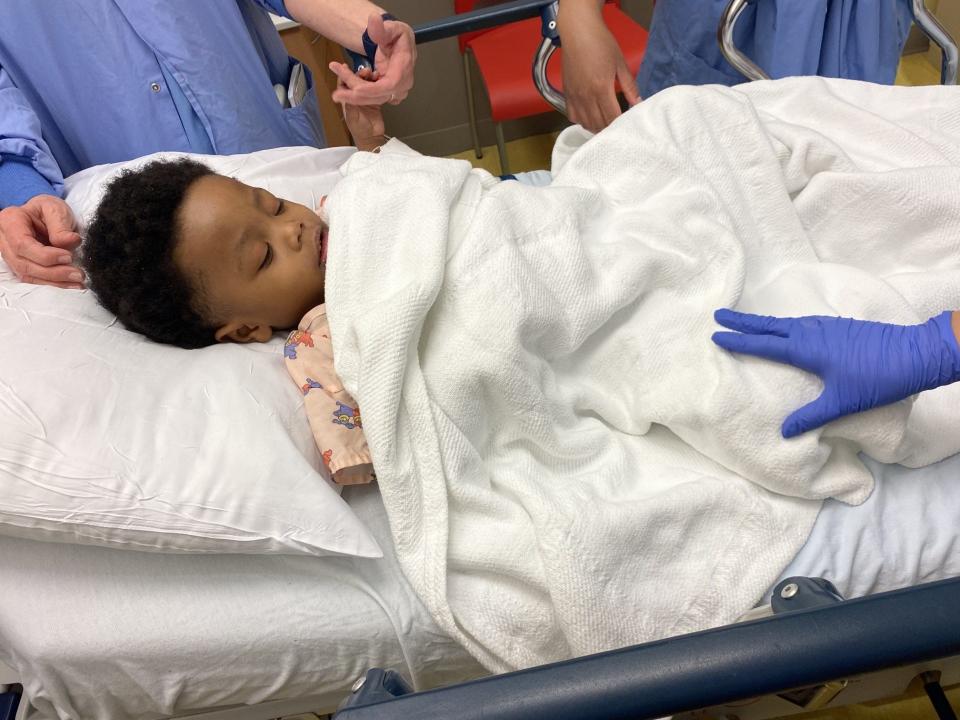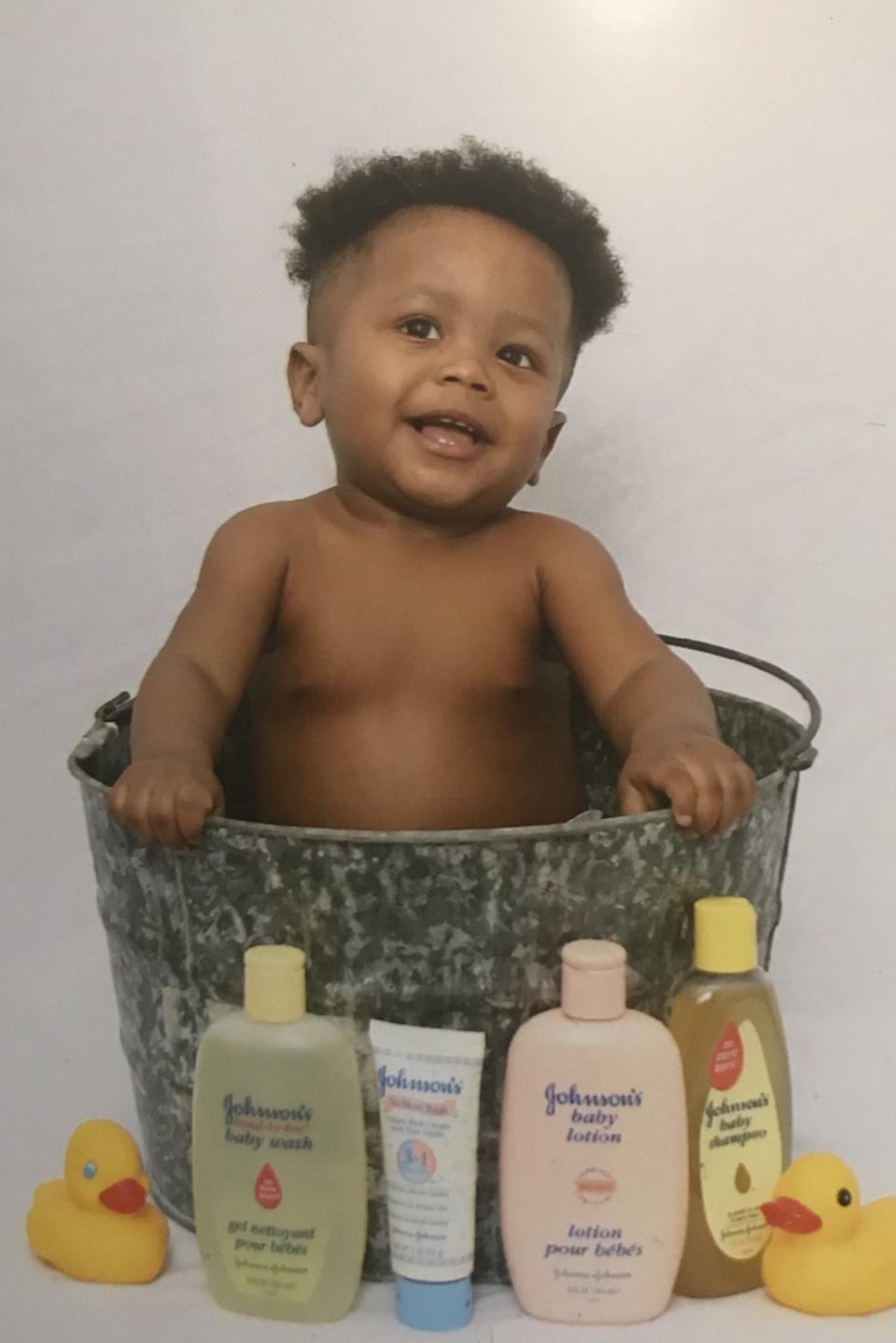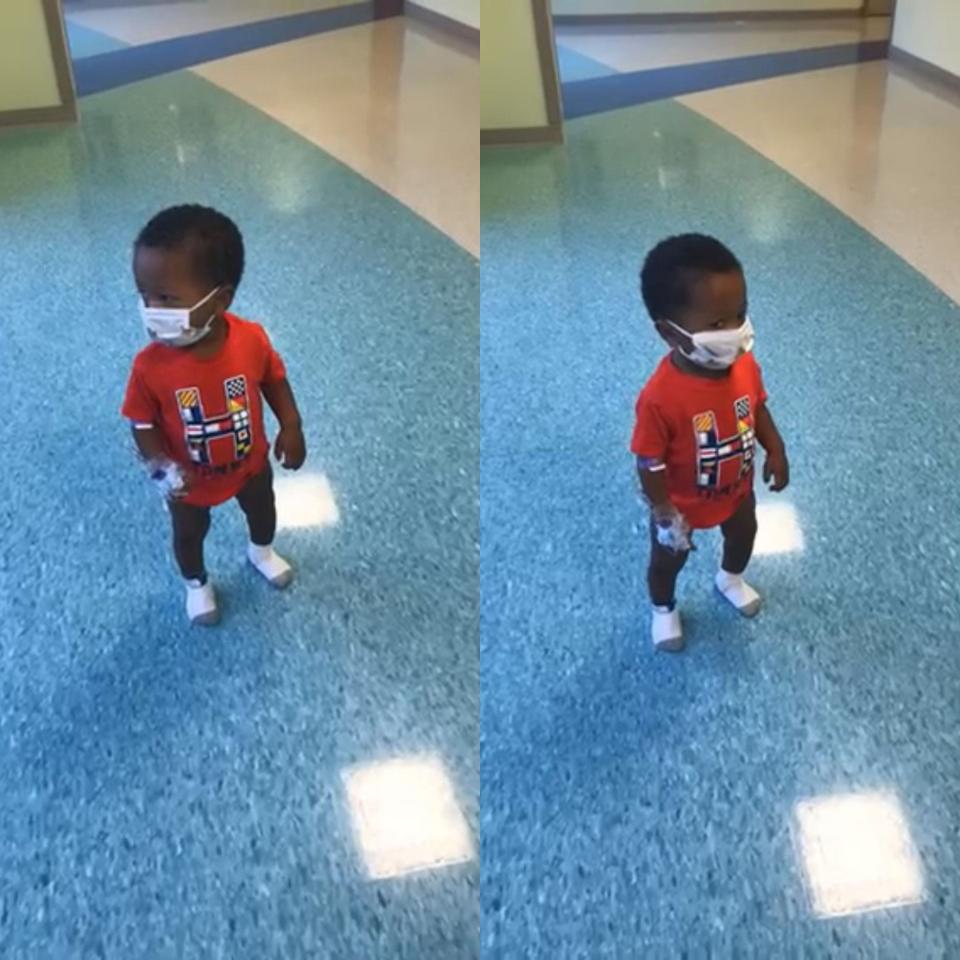Living with sickle cell disease: An Atlanta preschooler's desperate search for a bone marrow donor
Like most kids, Demon Evans loves Batman, Superman and Sonic. His mother said he would go to the park every day if he could, but some days, that’s just not possible.
The 4-year-old boy lives just outside of Atlanta with his mother, Octavia Evans, and was diagnosed with sickle cell disease shortly after he was born in 2019. He has endured more pain than anyone should have to bear, his mother told USA TODAY.
The family was hoping for some relief after connecting with a marrow registry called Be the Match, which helps patients find donors. They found a perfect match for Demon but in August, Evans said the boy's donor stopped responding to the group before surgery, leaving the mother of two feeling ashamed, down and isolated.
“Right before we were about to start doing the chemo, that's when I got a phone call from the BTM team,” said his mother, Octavia. “I'm telling my family. I'm telling friends. I'm telling people. I went into hiding after finding this out.”
Now, the family is searching for another donor for Demon.

Dr. Marianne Yee is a pediatric hematologist at the Aflac Cancer and Blood Disorders Center of Children’s Healthcare of Atlanta. She has been treating Demon for a few years and said his ideal match has the same bone marrow type as the boy and could be a sibling.
Demon's sister isn’t able to help, so they’re hoping to find a donor through the national registry.
“That, in theory, could be anybody but in reality, because this is inherited through families, it's much more common for somebody of your racial and ethnic background to share the same bone marrow type than somebody who's not,” Yee said.
Life-changing surgery: Doctor disconnects brain of 6-year-old with rare disease
What is sickle cell disease?
Yee said when two people who carry the sickle cell trait have children, those children inherit the disease.
Red blood cells have hemoglobin in them, the protein that carries oxygen throughout the body. In sickle cell patients, hemoglobin clumps together and deforms the blood cells, causing them to either break down, break open or get trapped in blood vessels Yee said.
“Red blood cells trapping in blood vessels stops the blood flow and that’s a very, very painful thing to go through,” she said. “That can happen, really, to any part of the body … an arm, a leg, back, anywhere.”
Lungs can also be damaged due to acute chest syndrome. Those with sickle cell disease are also at risk for strokes, bone damage, kidney failure and vision issues, she said.
Sickle cell is highly prevalent in ethnic communities
Yee, Demon’s doctor, said the sickle hemoglobin that is inherited through families likely originated in people of African origin centuries ago, which is why Black and African American people are often diagnosed with sickle cell disease.
Sickle cell disease is also prevalent in people from the Middle East, some southern parts of Europe such as Italy and Greece and also people from Brazilian and Caribbean groups, she said.
“If you just look prevalence wise at how common this disorder is, it by far … most prevalent in Black and African American patients,” she said.
'He survived': Texas community raises money for 6-year-old attacked with baseball bat in home invasion
Getting on the registry for a donor
After Demon was diagnosed with sickle cell disease, his mother wondered what she could do to help her baby boy.
She soon found out about Be the Match and got him on the registry for a transplant.
Last year, she wanted to be more informed and started meeting with the Be the Match team, who found a perfect match for him but it fell through.
His doctor said the biggest hurdle for those who need bone marrow transplants is finding a match or donor.
Ideally, doctors want the match to be perfect but there is a chance donors could be a 90% match, Yee said. If donors aren’t a perfect match, the body may reject the bone marrow or there could be complications.
Siblings have a 25% chance of being a match, Yee said, but sometimes it doesn’t work out.
The next step is to check the National Marrow Donor Program, which runs Be the Match. Thousands of people join the registry to see what their bone marrow type is and get matched to those in need.
Once patients have a match, Be the Match contacts the donor to see if they’re still healthy and interested in helping. Participation isn’t guaranteed though, Yee cautioned.
“There can be … so many different reasons why a donor might not come through,” she said, adding that sometimes the donor is interested but gets tested and has a health condition disqualifying them.
Sometimes donors learn more about the process and decide they aren’t ready to make that commitment.
Preschooler has been in pain since he was just 4 months old
Demon’s mother said she had no idea she had the trait to cause sickle cell disease and found out Demon has sickle cell disease after doctors ran tests like they do with all newborns.
“He was like 4 months when the sickle cell really just started to take an effect on his body,” she told USA TODAY Thursday afternoon.
He spent the first three years of his life getting blood transfusions every three or four weeks to reduce the pain and eventually, his spleen was removed, she said.

“It was vital,” she said. “If he didn’t get those blood transfusions, that was like a death sentence.”
Yee, his doctor, said he takes Hydroxyurea, a daily medication to slow the stop of sickle red blood cells and help his body make more of a healthier form of hemoglobin, the protein in red blood cells that carries oxygen throughout the body.
Demon’s mother said her son is a closed-in child. He’s in special education classes due to his struggles with speech but hasn’t been able to go to school consistently due to his health issues.
“Last year, Demon literally was in the hospital from October to December,” she said. “We'd leave and come right back. Every other week, we were there.”
He’s getting better now though and is back in the classroom with other kids, she said.
It bothers her that her son can’t live life normally like other kids. Just the other day, they went on a field trip to the pumpkin patch. After doing so much walking, he went home and had to take pain medicine. His legs were aching, she said.
“My son has this type of illness where he can’t even live a normal life, play certain sports, do certain things,” she said.

How to become a donor
His doctor said he had two potential perfect matches but they fell through. His mother is holding out hope they’ll find someone though and Demon’s team in Atlanta is communicating with Be the Match to find other donors.
Yee, his doctor, stressed that there is no way for people to join the registry and name Demon specifically but if people are interested in signing up, they can go to Be the Match’s website for more information.
From there, the organization sends donors kits to swab their cheeks, then sends the kit back with contact info. That’s how staffers can find out what a person’s bone marrow type is and enter them into the registry.
Donors may be called if they come back as a match for someone in need, Yee said.
Yee encourages all people to join Be the Match, especially people from ethnic backgrounds.
“There really is an underrepresentation in the registry of people who are not white,” she said. “That means that patients who have an ethnic background are less likely to find a donor and less likely to have that curative therapy, whether it's for sickle cell disease or really any other medical condition … that might need a bone marrow transplant.”
Visit www.tinyurl.com/BTMDonor to find out more about becoming a donor and www.tinyurl.com/BTMLocal to register for local events.
This article originally appeared on USA TODAY: Be the Match registry links bone marrow donors, patients nationally

